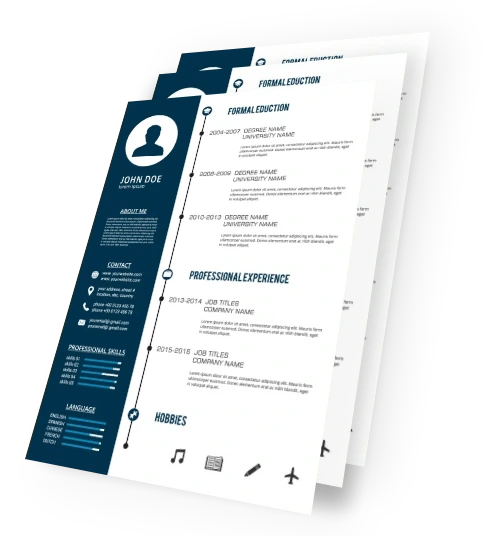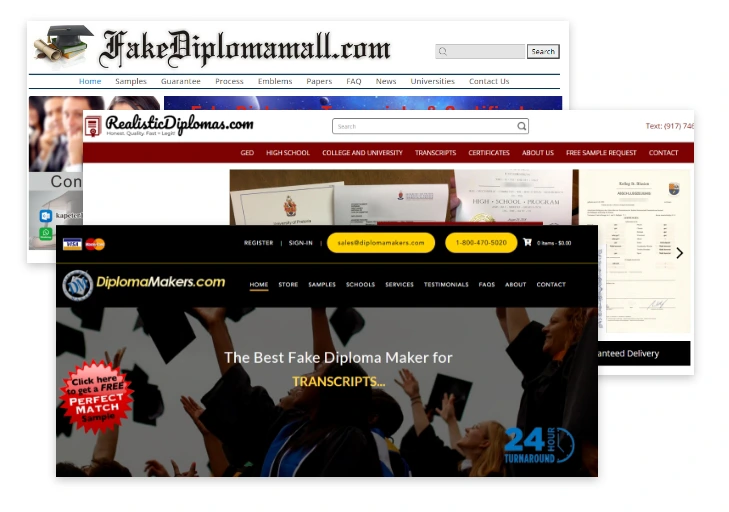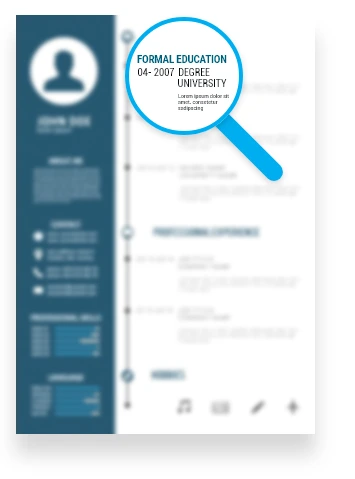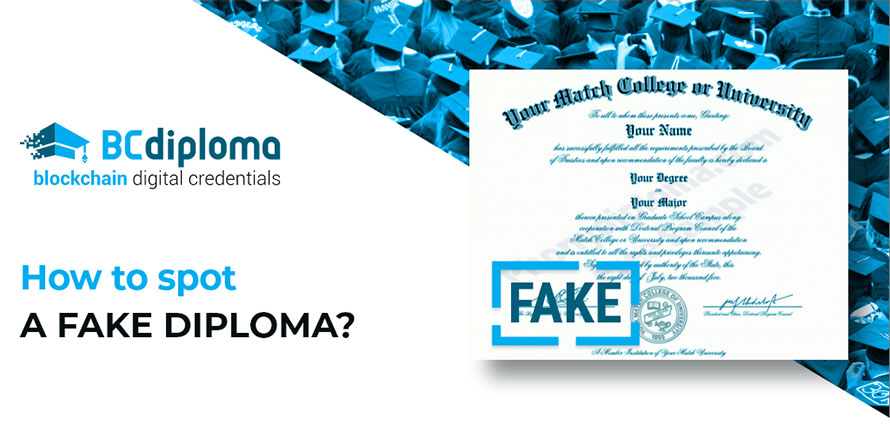BCdiploma Puts an End to the Scourge of Fake Diplomas
For educational institutions, the dematerialization and securing of certifications have become a strategic necessity to protect their credibility. For recruiters and HR services, manual verifications are a time-consuming and costly process that should no longer be necessary.
That is why BCdiploma offers the most effective and reliable solution: the issuance of tamper-proof digital certificates based on blockchain technology. Our diplomas are instantaneous and irrefutable proofs of authenticity, which immediately relieve recruitment services and enhance the value of education.

The Context of Fraud: Why the BCdiploma Solution is Essential
The fake diploma is an emerging species! With many universities and high schools no longer printing paper diplomas or academic transcripts, lying about a skill or certification has never been easier. Forging a diploma, inventing some training courses or adding false information to a resume are now common practices among unscrupulous applicants during a recruitment interview. For example, according to a 2018 Florian Mantione study, 85% of applicants agree that fixing their resumes is normal.
Fake diplomas are a serious problem in the academic sector. A simple Google search for “buy fake university diploma” turns up thousands of results and numerous sites from which to order a fake certificate or novelty replica. Some even promise to deliver fake paper diplomas within 24 hours. With digital technology, a university diploma, college degree or high school transcript can be edited with a few clicks, including sensitive data like grades or names. Faced with the scourge of fake diplomas, companies are also taking steps to detect false information and documents. Detailed questionnaires, verification with external organizations: during the recruitment phase, companies now have to include a control system concerning the training and education carried out by the applicant. For all parties, these enquiries mean a considerable amount of administrative work.

But identifying a fake diploma or transcript is not easy. How to distinguish a genuine degree from a fake diploma? What means are available to authenticate the information provided?
What can recruiters do to verify the authenticity of a degree or transcript and spot a fake diploma?
In 2013, a study by the recruitment consulting firm Florian Mantione put forward a frightening figure for recruiters: according to a sample of 352 companies surveyed, 33% of job applicants would often or always award themselves a fake diploma.

But what is a fake diploma? The fake diploma includes many different aspects, ranging from a falsified official document to a slightly embellished truth by an applicant during recruitment. For example, according to a study by the same firm, 75% of applicants’ resumes do not accurately reflect the applicant’s background. The fake diploma is not only a question of false documents: it includes more complex realities.
What solutions are available to recruiters?
Diploma or transcript verification through relevant agencies
According to RecrutementDigital, 33% of employers do not verify the diplomas presented and only 25% of recruiters request the original diplomas or ask to see the real academic transcript. The most effective, but also the most tedious verification for a recruiter is to inquire directly at the source. Recruiters can contact the organizations where the applicant claims to have received education or training, be it a high school, university, college or training institution. This direct approach is often the most recommended when in doubt about an applicant.
However, this process is time-consuming: it sometimes involves contacting several institutions and communicating with several intermediaries, and can become almost impossible for a large company with recruitment needs of several hundred people each year.
Finally, this verification process is also legally regulated: applicants must be informed of this procedure and give their consent. One more step in an already burdensome verification process.

Diploma verification with a former employer
Calling a former employer is becoming an essential step in the recruitment process. Studies show that the more professional experience applicants have on their resumes, the less the recruiting department will check their information. But, still according to the Florian Mantione study, only in 53% of the cases the position held corresponds to reality. Overhauled assignments, non-mastered skills, overvalued positions… Calling a former employer is often an effective way to identify ill-intentioned people.
Contacting the former employer appears to be a reliable way to verify the applicant’s training and skills.
What questions to ask a former employer?
- The overall assessment of the applicant;
- Actual assignments performed by the employee;
- Reasons for termination of the employment contract;
- The concordance of the skills listed on the resume with the skills acquired;
- The adequacy of the profile with the future missions.
What are the key points to address during the job interview?
Sometimes the falsification of a diploma involves applicants who have earned this diploma but lie about their academic background. Some applicants embellish their training and claim to have received skills that were never offered in their school program, or to have taken a subject in their school program that they did not study. This false information is often the most difficult for a recruiter to detect, because the applicant knows the institution and the courses offered there.
Finding out about the academic background in question beforehand will allow the recruiter to sharpen their questions during the interview. The more accurate a questionnaire is, the easier it is to detect a lie.
For example, it is advisable to research the subjects offered by the applicant’s training: name of the professor, module taught, etc. Thus, during the job interview, the recruiter can push the applicants to the limit while verifying if they have followed this academic path. Recruiters must trust their instincts; if they feel that applicants have not mastered certain aspects of their background, they must delve deeper to ensure the authenticity of the background.
In addition, one of the easiest ways to ensure the veracity of a foreign language diploma is to conduct part of the job interview in that language. The recruiter will then see directly the language skills of the applicant. On average, 64% of applicants overestimate their knowledge of a foreign language.
Can scrutinizing a resume or paper diploma help spot an attempt at deception?
Finally, the most obvious technique is to carefully analyze the degree itself. The diploma certificate is an official document that must be flawless. The text must be in the same font, without any spelling mistakes, the content must be consistent, and the signature of the document must appear clearly and distinctly.

Asking for specific information about the degree is also recommended. Data such as the full name of the degree and its specialization, the location or the year of graduation.
Some legal mentions are mandatory on an official diploma. Information such as the name of the degree in its entirety and the date and place of birth of the applicant.
Compliance with labor law and data protection
Finding out about the applicant’s real diplomas and experience is a necessary step for the recruiter. However, these actions are still regulated by law.
The applicant should be aware of the techniques the recruiter uses to verify skills and abilities. In addition, all research conducted must be directly related to the position being considered. According to Article L. 1221-6 of the French Labor Code, “This information must have a direct and necessary link with the job offered or with the assessment of professional skills. Article 9 of the Civil Code also protects personal data such as political opinions, religion or family of the applicant.
What solutions are available to help recruiters detect fake degrees?
Verifying the authenticity of an internal diploma is complicated and tedious: it can take time for the recruiter. And for businesses, time is money!
A recruitment process usually takes place over a short and limited period of time. Employers want to recruit their new employee as soon as possible: finding out about academic backgrounds and diplomas internally often seems like a waste of time.
In recent years, many technological innovations have been introduced to make it easier to review and verify credentials. Here is an overview of the different solutions that exist to help verify fake diplomas.
Can an auditing company be called upon for diploma verification?
An auditing company is an outside service provider that will do the proper research for the recruiter to authenticate a diploma. Verification is usually done through a database set up through partnerships with organizations issuing diplomas. In France, for example, we can mention the EveryCheck platform. Of course, you need to plan the appropriate budget to integrate this service into your administrative processes.
diplome.gouv.fr, the french government’s solution
Following the resurgence of fake diplomas, the French government has reacted: the Ministry of National Education has set up a platform where diplomas and certificates of achievement issued by the state are grouped together. This service allows you to download certificates, but also to provide access keys to potential employers so that they can be free to verify the diploma themselves.
What diplomas are listed?
- The GCSEs (Brevet)
- Vocational qualification (CAP)
- The baccalaureate (Baccalauréat général, technologique et professionnel)
- The advanced technician’s certificate (BTS)
The benefit of this platform lies in its reliability, as it is regulated and controlled by the state. However, few degrees are listed, and mostly high school level ones, which is a major drawback for companies looking for highly qualified applicants.
Can Blockchain and digital technology solve the issue of fake diplomas and credentials verification?
Blockchain certification solves the problem at its root. Using blockchain technology, Blockchain solves the problem at its root. Using blockchain technology, BCdiploma offers a 100% online, tamper-proof diploma and micro credentials dematerialization service.
BCdiploma enables higher education institutions that use the service to provide their graduates and students with secure, authenticated online credentials in any medium. With a URL link, you can provide direct and secure access to your authenticated diplomas or degrees, and secure high school transcripts for instance. Employers simply click on the link to view a diploma or credential and be assured of their veracity.
This technology is multilingual: diplomas, degrees, transcripts or certifications can be accessed in several languages from a unique link. This is a perfect option to certify the authenticity of a diploma obtained by French students who studied abroad, for example.
More than 250 institutions in 16 countries have chosen to trust BCdiploma’s blockchain technology. Companies’ recruitment departments no longer waste time trying to authenticate a university degree or high school diploma!
Frequently asked questions
Contact us for more information.
Through an order online, people may buy fake university, college or high school diplomas, be it for novelty – for instance a paper print replica of a college diploma to display instead of the original – or deception purposes. It’s also possible to create high quality, realistic fake high school or university transcripts with tools like Photoshop or online web services on specialized sites.
Recruiters and employers follow a specific series of steps to verify the authenticity of a diploma, degree or academic transcript. They can first contact the issuing institution, be it a university, college, high school or training organization. They may even scrutinize the document itself if they suspect a realistic fake or novelty diploma. And they will ask relevant questions to the applicant during the interview to identify potential contradictions.
Absolutely not! Opting to buy a fake or novelty high school diploma online will never help you get a job or get into college… Employers, universities and colleges will always do thorough background checks to verify the authenticity of a university diploma, college degree, high school transcripts or any other credential listed on an applicant’s resume.
Blockchain based authentication enables universities and colleges alike to issue 100% online, tamper-proof and even multilingual digital diplomas to their graduates, and high schools can use this digital technology to publish secure transcripts to their students. Such a secure solution is one of the best ways to provide authenticated academic transcripts and any other kind of certificate.
